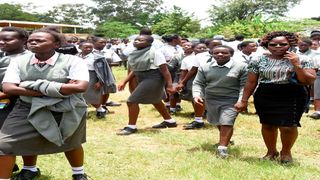
Parents picking up their children at Mukumu Girls High School in Kakamega on April 3, 2023, after it was closed indefinitely by the Ministry of Education officials following the death of two students.
News
Premium
We are very lucky to be alive: Mukumu students, cook speak of school's tragic ordeal
What you need to know:
- The Sacred Heart Mukumu Girls’ school suffered a disease outbreak that killed three students and a teacher.
- The school was closed on April 16, following the outbreak, and the Education ministry later transferred the Principal Fridah Ndolo, replaced her with Shikoti Girls’ Secondary School Principal, Sr Jane Mmbone, and disbanded its board of management.
Student 1 (Form 4)
Amid the Covid-19 pandemic, Nancy* left her family home in Nairobi and travelled to the Sacred Heart Mukumu Girls’ school located about 400 kilometres away in western Kenya. It was going to be her first prolonged stay away from home. She was scared, but ready to start her new life.
When she joined the school, she became proactive and was appointed a class prefect right from Form One. She was never a sickly child.
“My daughter only had mild headaches once in a while. But when she joined the school, she started having other strange illnesses,” said her mother.
Even then, the illnesses did not last long. However, on March 26 this year, her body felt alien.
“It started with a headache and stomach pains. I went to the sick bay where I found many other students seeking treatment. I was given a painkiller, and flagyl,” she says.
“In the morning I was not able to attend mass. The principal came to the sanatorium and, after assessing the situation, told us to write down our names. She informed us that we would be going home. Our parents were called,” she says.
Nancy’s dad came to pick her, and, with instructions from the school, they were told to go to specific hospitals where a Unique Personal Identifier (UPI) number would be used to meet costs of treatment.
“My daughter’s blood was drawn for testing. She was diagnosed with malaria and we were given antibiotics and malaria drugs. We did not use the antibiotics. When she took the malaria drugs, she vomited. She was weak and could not walk. All this time, her stool was black and she had a persistent diarrhoea,” narrates her mother.
The parents opted to give her home remedies like hot water and salt. Still, that did not work. A second visit to the hospital had little impact as her health deteriorated. Fortunately, after two weeks of being immobile and not eating much, she made her first few steps with the help of her grandfather. That day, she managed to eat and she was out of danger.
“I had planned to go back to school by Thursday because I am a candidate, but my situation got worse. I couldn’t even move. I really wanted to go back to school to take my exams but just when I mustered the strength to go back, our school was closed indefinitely,” she says, referring to the shutdown that was ordered by the Ministry of Education following mass illnesses at the school.
Student 2 (Form 2)
Olivia*, a Form Two student at Sacred Heart Mukumu Girls’ School, recalls feeling pain all over her body. Her aunt picked her from school on March 27 and, when she went to hospital, she tested positive for malaria.
“I stayed at home for a week and went for a second check-up and, when my stool was tested, I was told that I had a bacterial infection. I was also diagnosed with typhoid. I kept vomiting and had bloody diarrhoea,” she told the Nation.
Even after taking the medication and completing her injections, she still felt weak.
“I would sweat abnormally at night, and I had no appetite,” she adds.
Her grandmother, who took care of her during the period, was worried about her deteriorating health.
“It was an expensive affair. Even taking the tests from other hospitals to get alternative medical opinions required money. I am just glad that my granddaughter is now well,” she says.
*Students’ names have been changed for fear of retribution.

Douglas Muchela. He worked as a cook in the Mukumu Girls' school’s kitchen for more than 10 years.
Douglas Muchela, Whistleblower, Cook at Sacred Heart Mukumu Girls’ School
Douglas, a long serving cook at Mukumu Girls, speaks freely about the unfortunate happenings at the school. He was a victim as well, and luckily, he lived to tell his story.
He carried a meal of githeri from school to his home, after which he and his family came down with an illness that left them weak and scared.
“To this day, I am happy to be alive. At first, I didn’t want to speak about death. One time medical officers came to counsel us and I just started shivering. The counselling helped me a great deal because things were not looking good.
“So many of my colleagues had the symptoms that the students had. To see that most of us are back on our feet is a blessing,” he adds.





